By Sebastian Tapia
Argentine President Alberto Fernández toured Russia, China and Barbados this week in the spirit of multipolarity and multilateralism. Beginning to build the post-pandemic foreign policy agenda, the president argued that “the world is multilateral. In that world we must live and develop.” Both the destinations and the topics discussed on the tour affirm the multipolar orientation of Argentine foreign policy.
Russia
Fernández’ first stop was Moscow, where he met with the president of the Russian Federation, Vladimir Putin. The meeting in the Kremlin signaled the ratification of the process that began during the government of Cristina Fernández de Kirchner to deepen the Comprehensive Strategic Association between the countries.
We consulted Professor Anton Emelianov of the Moscow State Linguistic University, who commented on the meeting:
“The visit of the Argentine president to Russia that took place the other day demonstrates, once again, strong diplomatic ties between our countries despite the political situation in the world, especially given the attempts of the United States to disrupt countries in Latin America from interaction with the Russian Federation. The Argentine Republic, sovereign like Venezuela, follows its foreign policy agenda and remains committed to its historical allies. But in the context of the economic crisis, from which Argentina is trying to find a way out for the fifth year, it is the Argentine president who has taken the initiative to develop trade relations, not only in the framework of vaccine production, but also in the field of transport infrastructure and energy.”
Indeed, there was no new agreement signed in Moscow. However, both presidents recalled the recent advances in their relationship, such as Argentina’s purchase of electric trains from the Russian company Transmashholding (TMH), the provision of Sputnik V vaccines during the pandemic and its production in Argentina, cooperation in the area of nuclear energy and the 150% growth in trade between the two countries last year.
What the meeting made clear is how much each country values the relationship. Fernández explained that in Argentina’s relationship with Moscow, he sees an alternative to dependency on the United States. In his words :
“I am adamant that Argentina escape the strong dependency it has on the IMF and the US and make its way to other places. That is where it seems to me that Russia plays a very important role”.
For his part, the Russian president said : “I would like to point out that Argentina is one of Russia’s key partners.” Both countries enjoy “friendly relations based on law, respect and consideration of reciprocal interests . ” He also highlighted the coincidences in the look that these countries have towards international politics:
“Our countries firmly defend the principles of the international rule of law, sovereignty, independence and non-interference in the internal affairs of other States”
It is in the multilateral environment in which both countries seek mutual support to further their objectives. They agreed to cooperate in the United Nations, the G20 and to bring the Eurasian Economic Union and Mercosur closer together. As a part of this cooperation, the Argentine minister of economy, Martín Guzmán, continued his stay in Moscow to negotiate Russian support in the IMF to access transfers from a special stabilization fund.
Perhaps it is Fernández’s offer that best shows the good state of the bilateral relationship. The Argentine president proposed that :
“We have to see how Argentina becomes a gateway for Russia to enter Latin America in a more determined way”
China
The trip continued to Beijing, this time for more festive reasons, as the opening of the 2022 Winter Olympics was the original excuse for the trip. However, it also provided an opportunity to celebrate 50 years of bilateral relationship between the Argentine Republic and the People’s Republic of China. Fernández participated in the opening of the Olympic Games, a lunch that Xi Jinping offered to those presidents who attended the event, had a personal meeting with Xi, and then visited Mao Zedong’s mausoleum. The three-day visit had a number of positive results , among which are:
- The signing of a memorandum for the incorporation of Argentina to the Belt and Road Initiative. Argentina becomes the largest country in Latin America to join the initiative, through which it will be able to obtain financing for 23,000 million dollars in infrastructure projects.
- Agreement to begin production of the Chinese vaccine against COVID, Sinopharm, in Argentina
- Investments of 2,000 million dollars were agreed upon for the construction of a lithium production plant in Catamarca, the distribution of electricity in Buenos Aires, and the construction of a medical radioisotope reactor in China with the cooperation of INVAP.
- 13 cooperation documents were signed, including the commitment to streamline sanitary and phytosanitary negotiations, a “Strategic Action Plan for Agricultural Cooperation 2022-2027”, and agreements on green development, digital economy, space cooperation, Beidú navigation system, technology and innovation, university education and cooperation, agriculture, earth sciences, public media and medicine.
- The installation of a Consulate General of the Argentine Republic in Chengdu was requested, the fourth Argentine consulate in Chinese territory.
In terms of politics, Argentina obtained the support of China in the demand that the IMF review the surcharges on debt interest and the commitment to study the projects for channeling the IMF’s special drawing rights (SDRs) proposed by the Argentinian government. As part of the celebration of 50 years of diplomatic relations between the two countries, China ratified in a joint declaration in support of the Argentine claim to the Malvinas and the call for negotiations with the United Kingdom for the peaceful resolution of the conflict. Argentina, for its part, ratified its support for the “One China” policy.
To make a general assessment of Fernandez’ trip to China, we consulted Gustavo Girado, a master in international relations and director of the specialization in Contemporary China at the National University of Lanús:
“The tour was positive, first because it has been very functional to Chinese interest in particular, since the Belt and Road initiative has managed to get one of the four largest economies in Latin America to join. In addition, Alberto Fernández is presiding pro tempore over CELAC, which is the institution that China has chosen as an interlocutor for regional relationship developments. Thirdly, not only was a Latin American president present at the opening of the Olympics, but he took the opportunity to commemorate the fiftieth anniversary of the countries’ bilateral relationship.
From the point of view of Argentina, with its very delicate macroeconomy, this is all very clearly positive. Not only is the message to the international financial community positive, but to the extent that financing for works in our country is absent, the Belt and Road initiative enables Argentina to be part of the menu of options available to Chinese capital to participate in infrastructure investment projects, never losing sight of the fact that the classic Chinese exportable offer is made up of technology, infrastructure and financing. Argentina has excess demand for that and China has excess supply. Just as Argentina has its classic export products (foods from a temperate climate and some industrial minerals), China is a net importer of them.
The eventual promise of binational investments, from both private capital’s participation in joint ventures or Chinese public companies directly participating in infrastructure projects, is designed to revitalize a series of projects that had been halted”.
Barbados
The tour concluded with a visit to Barbados, the youngest republic in the world. The island recently removed the Queen of England as head of state and elected a female president of its own. The visit of the Argentine president takes place in the context of Argentina’s presidency of CELAC, as a gesture to the need to increase ties with Caribbean countries. In addition to meeting with the Prime Minister of Barbados, Mia Motley, Fernández met with representatives of the members of the Organization of Eastern Caribbean States.
The visit to Barbados and contact with other Caribbean countries is a sign of gratitude for the support of these countries in negotiations with the IMF and in the support of the Argentine claim on the Malvinas.
The moment
President Alberto Fernández’s tour was an important strategic moment for the three countries. Russia, in full confrontation with Europe and the United States, is showing that it has close allies in other regions that are not going to abandon their ties just to coincide with Western discourse. China, also at odds with the United States and some countries that proposed boycotting the Olympic Games, benefits from Alberto’s visit showing support for the games and the Belt and Road initiative. Argentina is going out into the world to seek financing for infrastructure that will allow it to grow economically and consolidate its multipolar policy.
Between Fernández’s meeting with Putin and the meeting with Xi, both Eurasian presidents presented a joint statement announcing their principles for “international relations entering a New Era and global sustainable development”. Putin and Xi discussed how to organize a changing world while meeting with the Argentine president.
A clear sign that Argentina’s foreign policy seeks to consolidate itself in a multipolar matrix is the request made to both President Putin and President Xi to incorporate Argentina into the BRICS group, resuming the attempt that was made during the government of Cristina Fernández to join the organization. The potential return of Lula to Brazil would revitalize the group and the presence of Argentina would give the region even more strength.
However, there is one pole of the emerging multipolar world that does not seem to offer anything positive for Argentina. In the conclusion of negotiations with the IMF and the tour, President Fernández made this very clear:
“Europe helped me, Russia, China, the Latin American countries helped me, and that’s where it stops. I know who worked for the loan to be granted”.
This article was first published in spanish on Miradasdelsurglobal.com.







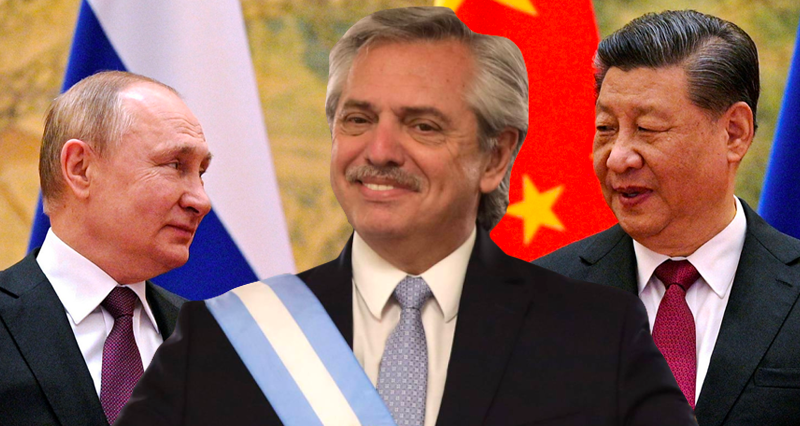
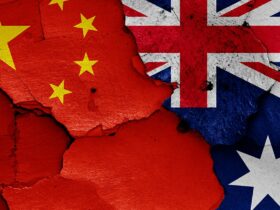

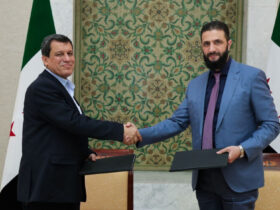
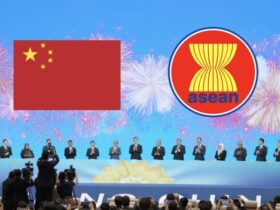
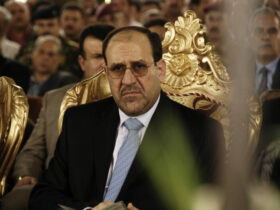
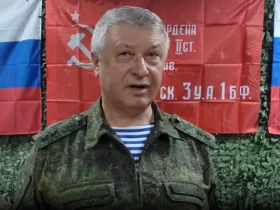
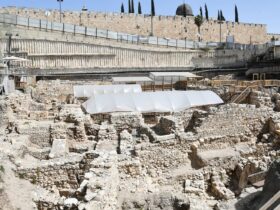

Leave a Reply